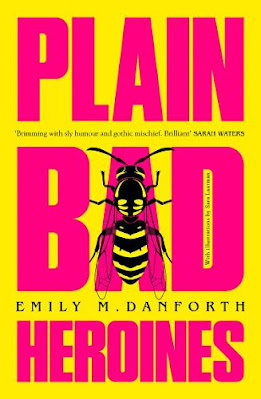Book #81
1902, Brookhants School for Girls: students Flo and Clara are madly in love with each other, as well as completely obsessed with The Story of Mary MacLane, the scandalous debut memoir by 19 year old MacLane. A few months later they are found dead in the woods, after a horrific wasp attack, the book lying next to their intertwined bodies. Within five years the school is closed. But not before three more people die on the property, each in a troubling way.Over a hundred years later, Brookhants opens its doors once more, when a crew of young actresses arrive to film a high-profile movie about the rumoured Brookhants curse. And as past and present become grimly entangled, it’s soon impossible to tell quite where the curse leaves off and Hollywood begins.
The layers to this novel are incredible. Danforth introduces us to the Brookhants School for Girls in 1902, immediately setting the scene with a tragedy and already foreshadowing the curses, bad luck, and omens yet to come. She then whisks us into the present day, to the world of Hollywood, where a film about the school and its misfortunes is being created. And we already know all about cursed Hollywood films, don’t we? So it’s a story about a story, which, in turn, turns out to be set in motion by another story. As I said - layers.
In 1902 we follow the headmistress and her fellow teacher and live-in ‘companion’ (note: lesbians) after the tragedies begin to strike the school. We’re allowed to see these unfold before hearing of how the women met, how their relationship developed, how the school was inherited, and, ultimately, how the curse was wrought upon the land.
We then meet our three plain bad heroines who are involved in the film production of Brookhants - two actress and an author, all with deep back stories, all uncertain of power of the location, and all deliciously queer.
Danforth has done something powerful with her LGBT characters here. I’m probably reading the wrong books, but it’s rare to see a queer character who hasn’t just been thrown in for diversity or effect, like the gay best friend or the token couple. These women were real, fleshed out, in love. It was really gorgeous to read.
Our narrator is a character within herself. With her cutting comments, sarcastic observations, and numerous footnotes, she becomes a presence in herself; an all-seeing eye with an almost unstoppable mouth. Her caustic social and political remarks coupled with her side comments made for a truly memorable and unique narrator.
Despite an almost palpable level of tension building throughout the novel, I was disappointed in the ending of the present day storyline. There was ambiguity, which I can appreciate in a finale, but I felt it could’ve packed a better punch than the one I received. The 1902 storyline ended miraculously, which meant this one paled in comparison. But, really, it didn’t ruin much of my enjoyment overall. I think this novel is one for the journey rather than the destination.
I really did like this. Please recommend (or write) more lesbian ghost stories.
“My bright smile haunts no one. I shoot no opaque glances from my eyes, which are not like the sea by any means. I have never eaten any viands, and my appetite for what I do eat is most excellent. And my voice has never yet, to my knowledge, been full of tears.
No, I am not a heroine.”

